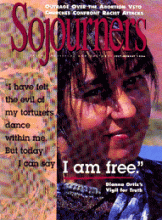One day in early May I left Sojourners Neighborhood Center for about an hour to run to the post office and the bank. When I returned to my office, Keisha was there waiting for me. “Are you going to be hiring classroom aides in the Freedom School this summer? Can I apply?”
Keisha, 15, began participating in the center’s children’s program when she was 8 years old. Last year she worked here in her first summer job, serving as a classroom aide for the Nkym-Nkym sisters (8- to 10-year-old girls). During the Freedom School summer program, Keisha learned how to lead the group in reading exercises, how to resolve conflicts that arose, and how to be a good role model for her younger sisters, even when they tested her to her limit.
Next was a phone message from Michelle: “Be sure to save me a place in Freedom School. Last summer was great!” Michelle, now a 20-year-old college student, lives just a few doors down the street. She also began participating in our children’s program at age 8. Last summer she worked as a Servant Leader Intern (primary group leader) for the Ngomas, our 5- to 7-year-old boys and girls.
Since then, I have been stopped on the stairs and on the street by other young people who want to work and are willing to learn how to be good workers. In Columbia Heights, our neighborhood of Washington, D.C., almost all of the families with children live below the poverty level, more than half of our children still do not graduate from high school, and 40 percent of our young adults are unemployed.
Street violence is at an all-time high. Between January 1 and April 1 of this year, there were more than 150 street robberies on just the few blocks surrounding our center. Despite these statistics, most of the young people who live here want to graduate from high school and they want to work. What they need to “make it” is opportunity—access to academic support and training for employment.
Read the Full Article
